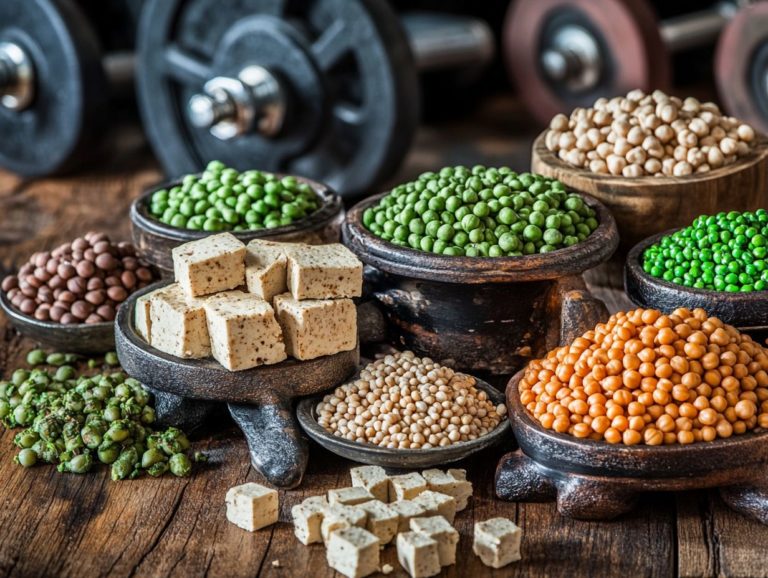5 Benefits of Taking a Daily Probiotic
Probiotics have captured attention, and for good reason! These friendly bacteria help maintain gut health and provide an impressive array of health benefits that can elevate your overall well-being.
From enhancing digestive health to bolstering the immune system, these beneficial bacteria are essential for maintaining a balanced body. If you’ve ever been curious about how probiotics function, the various types available, or how to seamlessly integrate them into your daily routine, this article will guide you on an exciting journey to better health!
Explore the advantages of incorporating a daily probiotic and discover how they could transform your health! Don t miss out on these incredible health benefits!
Contents
Key Takeaways:

Daily probiotic intake can improve digestive health, reducing symptoms like bloating and gas.
Probiotics help strengthen the immune system, reducing the risk of common illnesses like colds and flu.
Taking a daily probiotic may aid in weight management by regulating gut bacteria and promoting a healthy metabolism.
1. Improves Digestive Health
Probiotics play a crucial role in elevating your digestive health by enhancing gut wellness through beneficial bacteria like Lactobacillus and Bifidobacterium. These microorganisms help maintain a balanced community of bacteria in your gut, helping ease the effects of digestive disorders such as irritable bowel syndrome and ulcerative colitis.
They are also effective at combating harmful bacteria like Clostridium difficile, reducing antibiotic-associated diarrhea, and promoting overall gastrointestinal health.
Emerging research highlights that these live microorganisms do more than just improve digestion; they also contribute to the diversity and resilience of your gut microbiome, which is essential for optimal health.
According to a study published in Advances in Nutrition, a diverse gut microbiome can enhance nutrient absorption and bolster your immune system. Dietary fibers are pivotal in maximizing probiotic efficacy; they act as prebiotics, nourishing beneficial bacteria and supporting their growth.
The National Institutes of Health underscores the importance of incorporating fiber-rich foods think whole grains, fruits, and vegetables into your diet to foster a thriving gut microbiome.
This synergy between probiotics and dietary fibers creates a robust digestive environment that can significantly enhance your overall health.
2. Boosts Immune System
Probiotics are your allies in boosting the immune system by enhancing gut health, offering a multitude of benefits that can help you prevent chronic conditions and infections.
Research shows that maintaining a balanced gut microbiome is essential for optimal immune function, as it regulates your body’s inflammatory responses and helps ward off pathogens. By supporting this delicate ecosystem, probiotics play a crucial role in reducing the risk of various chronic ailments, including diabetes and cardiovascular diseases.
Studies from Harvard Health Publishing show that regularly taking probiotics can make your gut flora more diverse, which strengthens your immune response.
EatingWell underscores the significance of dietary sources of probiotics, which not only preserve gut health but also contribute to your overall well-being, allowing you to lead a healthier life.
3. May Help with Weight Management

New evidence shows that probiotics may help with weight management by promoting gut health and enhancing microbiome diversity, both of which can influence metabolism and fat storage.
Research indicates that these beneficial bacteria help regulate appetite hormones like leptin and ghrelin, leading to improved feelings of fullness and a reduction in food cravings.
Certain strains of probiotics are known to enhance the breakdown of fats and carbohydrates, potentially increasing energy expenditure. Dietary supplements containing these probiotics have shown promise in clinical trials, with some participants experiencing notable reductions in body weight and fat mass.
Such findings underscore the importance of incorporating specific probiotic strains into your weight management strategy, encouraging you to consider them as a valuable component of a balanced approach to health.
Before starting any probiotic regimen, it’s a good idea to consult with a healthcare professional.
4. Can Improve Mental Health
Probiotics do more than just support your digestive health; they also hold the promise of enhancing your mental well-being through the intriguing gut-brain connection. This connection shows how gut health is closely linked to psychological wellness and reducing anxiety.
This captivating relationship reveals that your gut bacteria play a crucial role in influencing neurotransmitter production and overall brain function. Recent studies published in esteemed journals like Nutrients and Nature Microbiology suggest that specific strains of probiotics can change the gut’s microbial landscape, leading to lower anxiety levels and improved mood.
For example, research shows that individuals who incorporate particular probiotics into their routine often experience notable boosts in mental clarity and emotional stability. These findings highlight the potential of probiotics as a valuable addition to mental health treatment, transforming how practitioners approach therapy for anxiety and depression.
5. May Reduce the Risk of Certain Diseases
Regularly including probiotics in your diet may lower your risk of specific diseases, such as cardiovascular issues and other chronic conditions. This is achieved by fostering a balanced gut microbiome and reducing health risks.
Research emphasizes the vital role these beneficial bacteria play in regulating inflammation, a key factor in developing many chronic diseases.
For instance, a study published in the Journal of Clinical Medicine found that individuals who regularly consumed probiotics had significantly lower cholesterol levels, thus reducing their risk of heart disease. Other research shows that probiotics can help manage type 2 diabetes by enhancing insulin sensitivity, crucial for effective metabolic function.
These insights suggest that including probiotics in your daily routine not only boosts gut health but also helps prevent various health issues, paving the way for a longer, healthier life. Start including probiotics in your daily routine today for better health!
What Are Probiotics and How Do They Work?

Probiotics are live microorganisms, often called ‘good bacteria,’ that provide significant health benefits, mainly in digestive and gut health. When consumed in adequate amounts especially strains like Lactobacillus and Bifidobacterium, often found in dietary supplements and fermented foods you can boost your health significantly!
These helpful microbes are essential for maintaining a balanced gut bacteria, enhancing nutrient absorption, and strengthening your immune system. By aiding in efficient digestion, probiotics can help alleviate common issues like bloating and constipation.
Moreover, they may have broader health implications, including a reduced risk of infections and support for mental well-being through the intricate gut-brain axis, which refers to the communication between your gut and brain.
You ll find key sources of probiotics in fermented dairy products like yogurt and kefir, along with non-dairy options such as sauerkraut, kimchi, and kombucha. This variety makes it easy to integrate them into your daily diet.
What Are the Different Types of Probiotics?
You ll find a variety of probiotics available, with the most common being Lactobacillus, Bifidobacterium, and Streptococcus.
Each of these offers distinct health benefits and plays a vital role in enhancing your overall gut health. Lactobacillus, often present in yogurt and fermented foods, helps digest lactose and produces essential nutrients like vitamins B and K.
Bifidobacterium, typically sourced from dairy products and supplements, outsmarts harmful bacteria in your gut while bolstering your immune response.
Then there’s Streptococcus thermophilus, another superstar found in yogurt, which has shown potential in alleviating lactose intolerance and easing gastrointestinal issues.
Research suggests that these probiotics can elevate your digestive health, boost your immunity, and even support your mental well-being through the gut-brain axis, making them essential in today s dietary landscape. Try incorporating some new probiotic foods into your diet today!
How Many Probiotics Should One Take Daily?
The recommended daily intake of probiotics can vary significantly based on specific strains and individual health needs. General guidelines suggest a range of 1 to 10 billion CFUs (colony-forming units) each day.
Your age, health status, and dietary habits play crucial roles in determining the right dosage. For example, young children and the elderly may require different probiotic formulations since their gut microbiota often differs from that of adults.
If you have specific health conditions like irritable bowel syndrome or have recently taken antibiotics, you might need higher dosages to restore balance. It’s essential to consult healthcare professionals for tailored recommendations based on your unique health profile.
Research shows that certain strains, such as Lactobacillus and Bifidobacterium, may yield better results at varying dosages. This indicates that a one-size-fits-all approach just doesn t cut it.
What Are the Potential Side Effects of Taking Probiotics?

Probiotics are generally safe for most people, but it’s important to be aware of potential side effects like digestive discomfort, gas, and bloating, especially if you have existing digestive issues.
These symptoms are usually mild but can be more pronounced for those with chronic conditions or individuals taking immunosuppressive medications. Therefore, it’s crucial to consult your healthcare provider before starting any probiotic regimen, as not every strain is suitable for everyone.
Individuals with compromised health may experience adverse reactions. For instance, a study published in the Journal of Clinical Gastroenterology noted that patients with irritable bowel syndrome reported increased bloating after using probiotics.
By understanding your own health situation, you can manage risks while enjoying the potential benefits of probiotics.
Can Probiotics Be Beneficial for Children?
Imagine giving your child the gift of better health with probiotics! These friendly bacteria can promote digestive health and potentially boost their immune system, laying a solid foundation for their overall well-being.
Research shows that probiotics can effectively help manage common digestive issues such as diarrhea and constipation, which are often seen in younger children.
Experts recommend including specific strains like Lactobacillus rhamnosus to help maintain a healthy gut microbiome, which is essential for nutrient absorption and disease prevention.
Studies indicate that probiotics can help reduce the severity and duration of gastrointestinal infections.
By incorporating these beneficial microorganisms into their diets, you can equip your children with valuable tools to strengthen their defenses against illness.
Consult your healthcare provider to explore the best probiotics for your family and take a step towards better health today!
How Can You Incorporate Probiotics into Your Diet?
You can easily add probiotics to your diet in fun ways! Enjoy delicious fermented foods like yogurt and kefir or choose high-quality supplements specifically designed for gut health.
Include a variety of probiotic-rich foods in your meals. Think sauerkraut, kimchi, and miso for a tasty boost.
Fermented foods are not just tasty; they are full of good bacteria that support digestive wellness. A diverse range of good bacteria in your gut helps your body fight off germs and absorb nutrients better.
Whether you choose to enjoy probiotics through food or supplements, being consistent can lead to noticeable improvements in your gut health and overall well-being.
Frequently Asked Questions
What are the benefits of taking a daily probiotic?
A daily probiotic can improve digestion, boost your immune system, regulate bowel movements, support weight management, and enhance skin health.
How does a daily probiotic improve digestion?
Probiotics contain good bacteria that help balance the natural bacteria in your gut, leading to better digestion and nutrient absorption.
Can a daily probiotic boost the immune system?
Yes! Probiotics can enhance immune function by increasing the production of immune cells, helping you fend off infections and illnesses.
Will taking a daily probiotic regulate bowel movements?
Probiotics help balance the gut s good bacteria, improving the consistency and regularity of bowel movements. This is especially helpful for those with constipation or diarrhea.
Are there any weight management benefits to taking a daily probiotic?
Some studies suggest that probiotics may help with weight management by boosting metabolism and reducing belly fat. More research is needed to confirm this.
Can a daily probiotic enhance skin health?
Yes! Probiotics can reduce inflammation, treat acne, and promote skin hydration. They may also help with conditions like eczema and rosacea.






